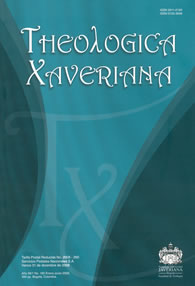Resumen
Este artículo pretende mostrar el creciente interés que existe por Raimon Panikkar, teólogo y filósofo un tanto desconocido en el contexto y quehacer teológico latinoamericanos. En unprimer momento se evidencia, a través de su vida y las fases de su pensamiento, la seriedad con la cual ha asumido una
reflexión caracterizada por el diálogo permanente entre el cristianismo, el hinduismo y el budismo, condición que lo ubica como teólogo del pluralismo religioso. El segundo momento da cuenta de un sinnúmero de estudios teológicos y religiosos que se han realizado a partir de su obra, que van desde lo típicamente religioso-cultural hasta lo más sensible de la teología dogmática. Una mirada comprensiva de su ser y hacer se convierten en una invitación novedosa para el trabajo teológico actual.
Esta revista científica se encuentra registrada bajo la licencia Creative Commons Reconocimiento 4.0 Internacional. Por lo tanto, esta obra se puede reproducir, distribuir y comunicar públicamente en formato digital, siempre que se reconozca el nombre de los autores y a la Pontificia Universidad Javeriana. Se permite citar, adaptar, transformar, autoarchivar, republicar y crear a partir del material, para cualquier finalidad (incluso comercial), siempre que se reconozca adecuadamente la autoría, se proporcione un enlace a la obra original y se indique si se han realizado cambios. La Pontificia Universidad Javeriana no retiene los derechos sobre las obras publicadas y los contenidos son responsabilidad exclusiva de los autores, quienes conservan sus derechos morales, intelectuales, de privacidad y publicidad.
El aval sobre la intervención de la obra (revisión, corrección de estilo, traducción, diagramación) y su posterior divulgación se otorga mediante una licencia de uso y no a través de una cesión de derechos, lo que representa que la revista y la Pontificia Universidad Javeriana se eximen de cualquier responsabilidad que se pueda derivar de una mala práctica ética por parte de los autores. En consecuencia de la protección brindada por la licencia de uso, la revista no se encuentra en la obligación de publicar retractaciones o modificar la información ya publicada, a no ser que la errata surja del proceso de gestión editorial. La publicación de contenidos en esta revista no representa regalías para los contribuyentes.


